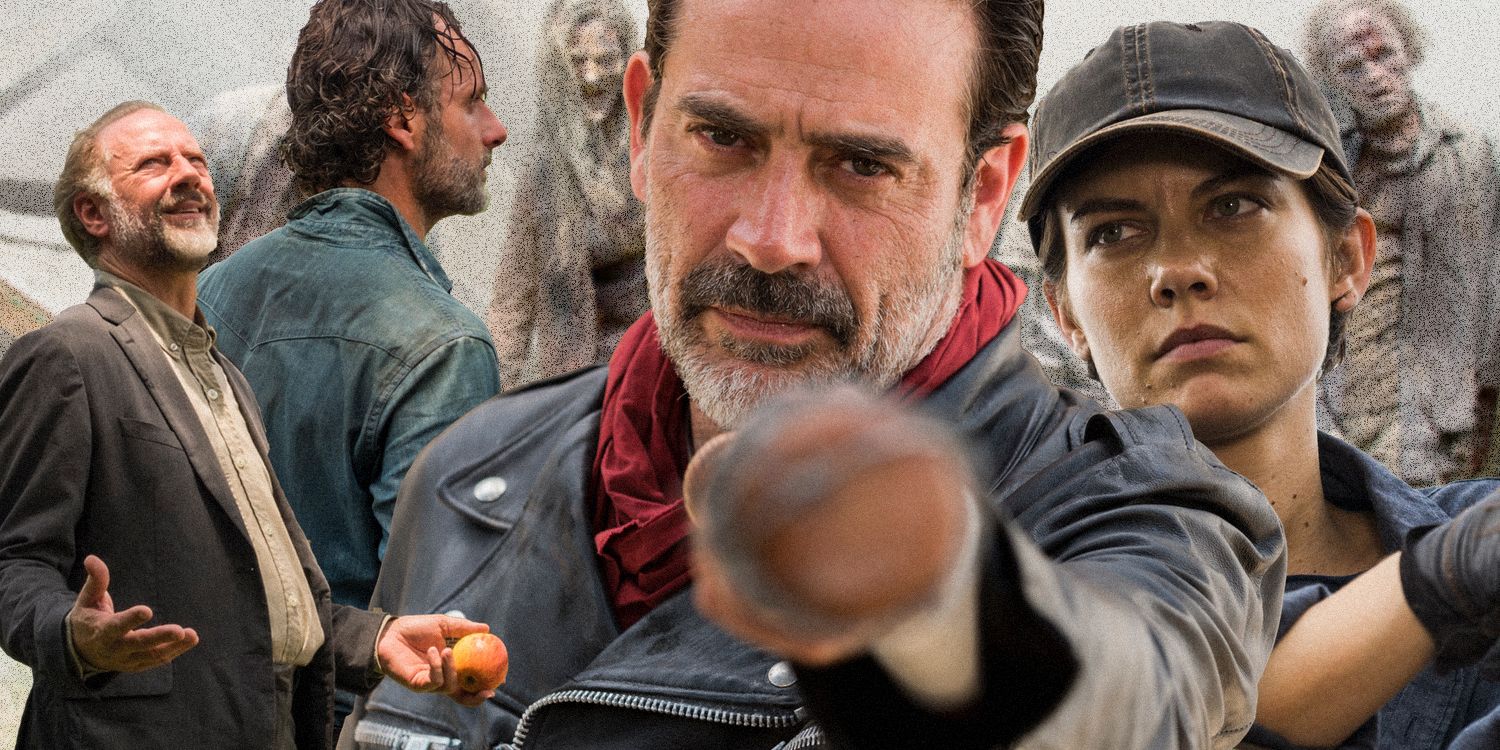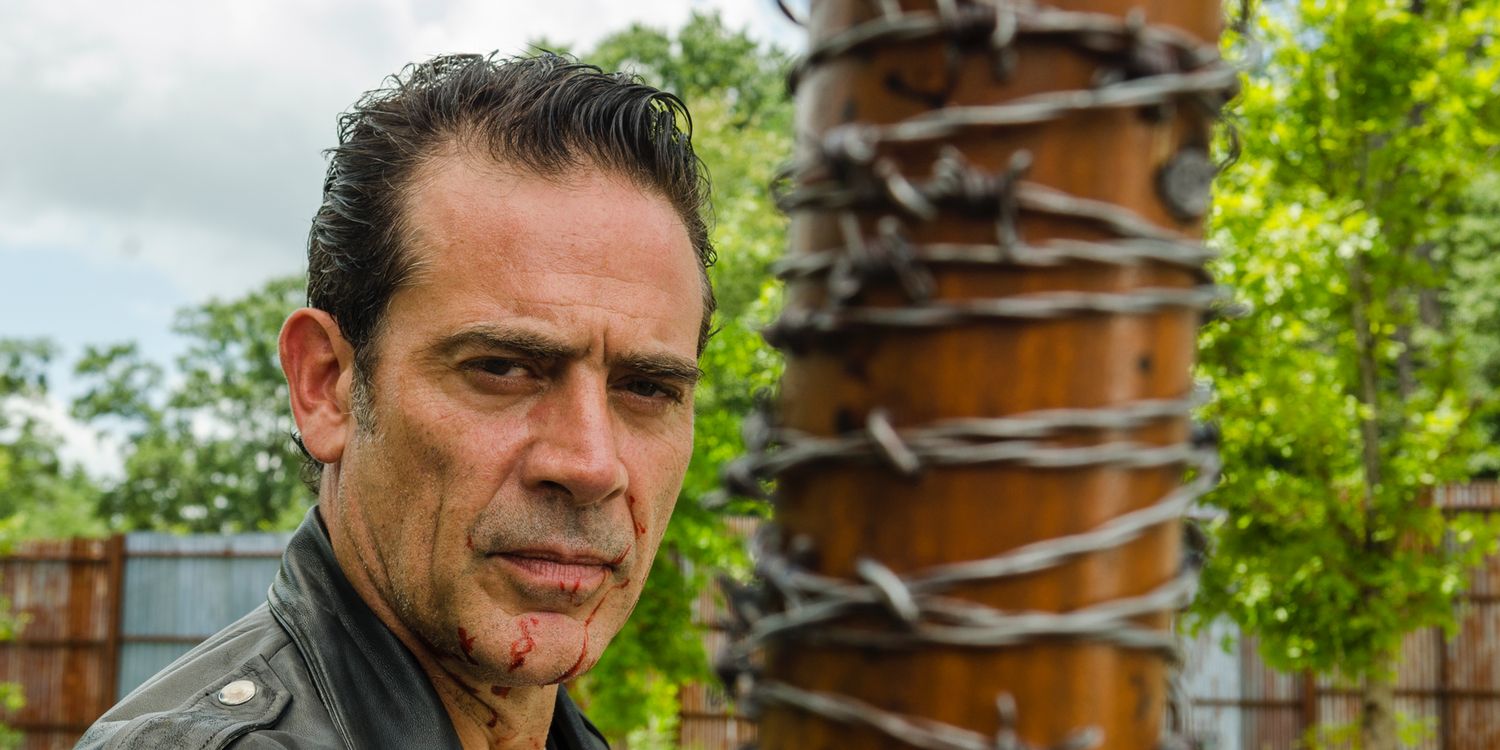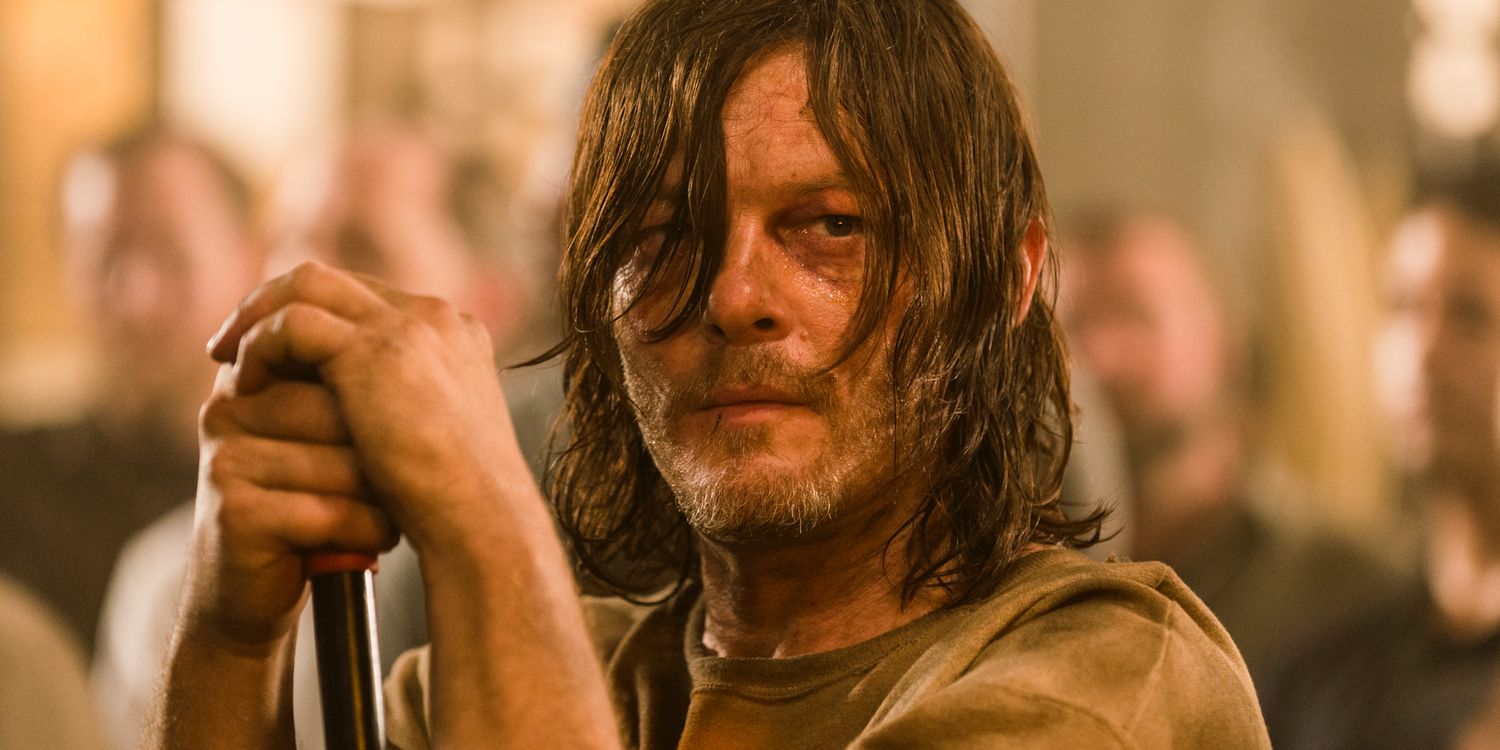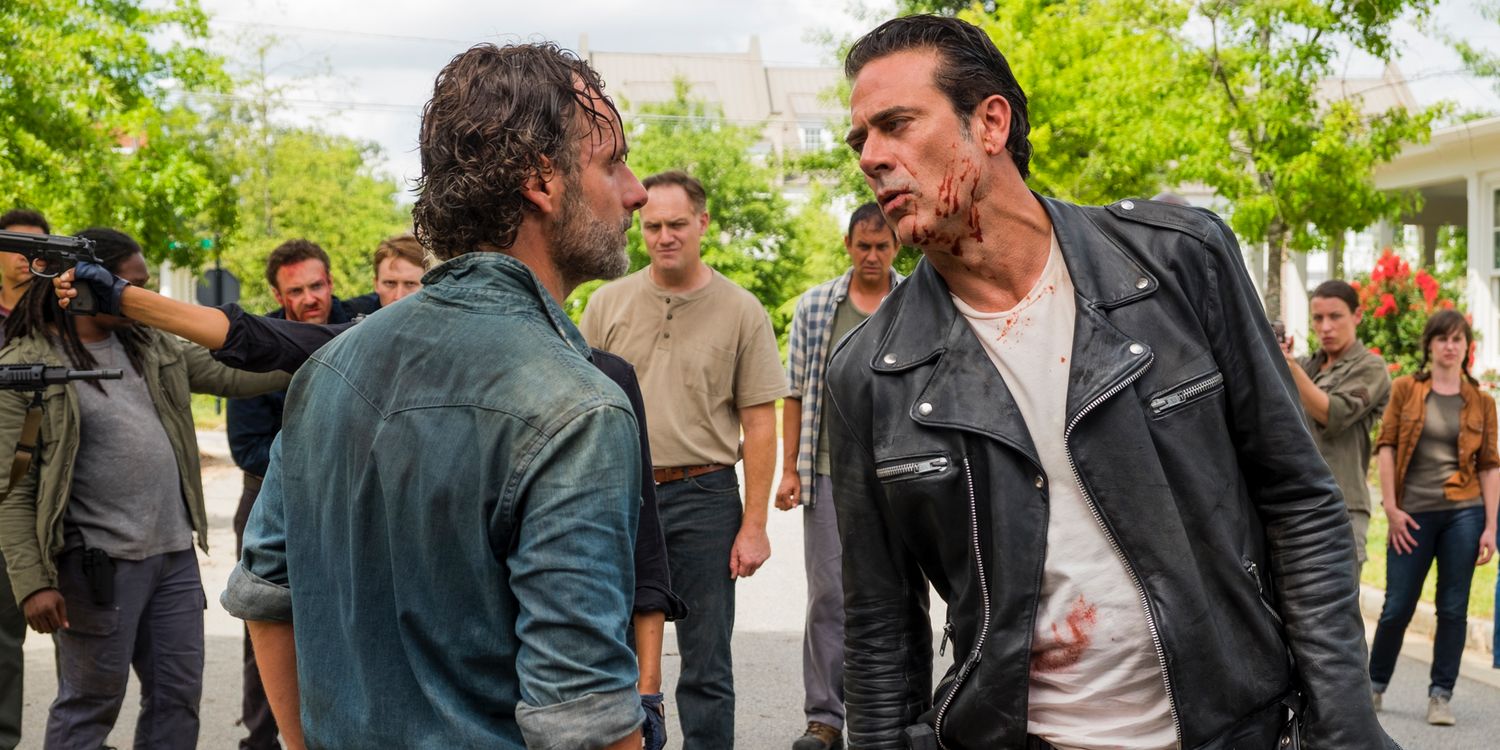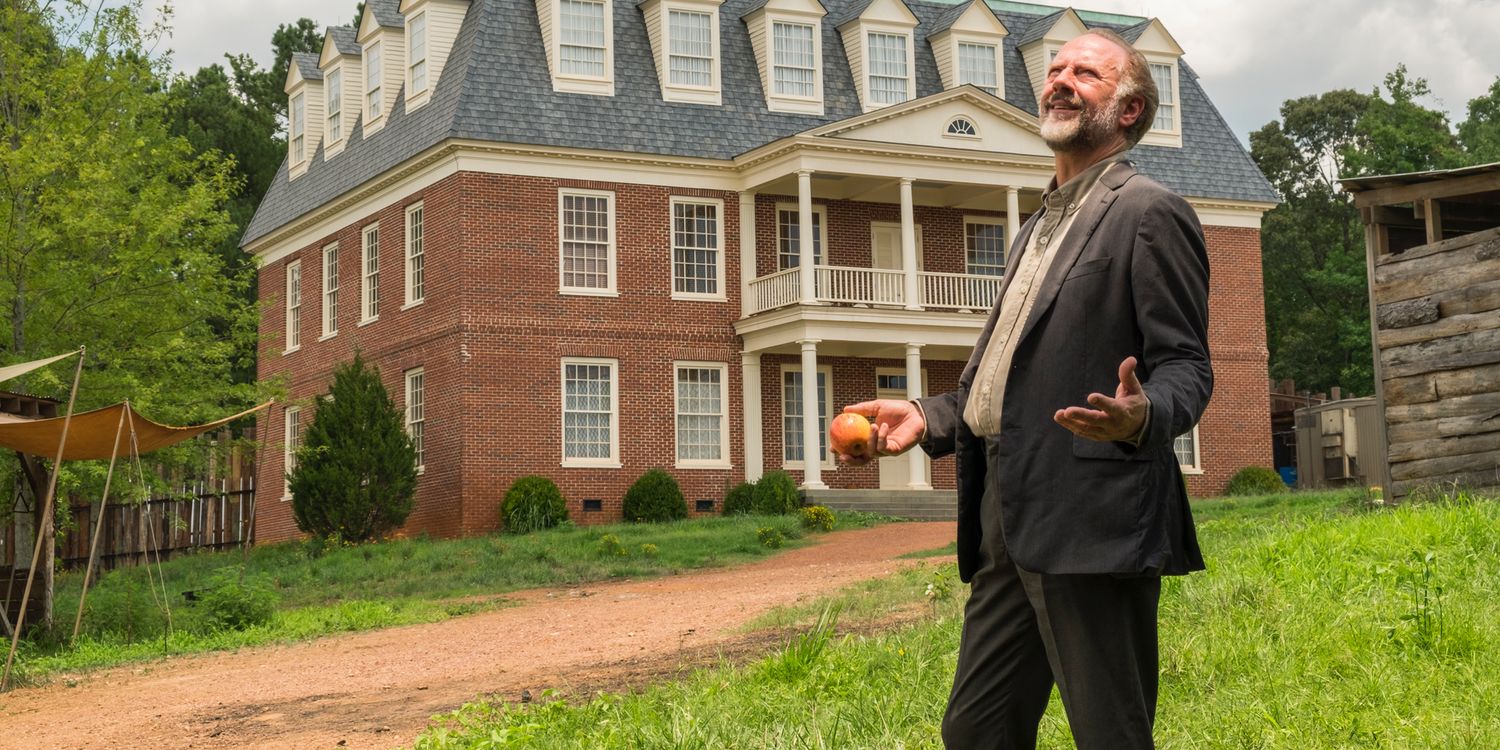The Walking Dead brought the first half of season 7 to a close with a revelation: If they are to survive, Rick and his crew will have to fight back against Negan and his Saviors. It was a solid moment on which to end a better-than-expected episode. Like a reflexive memory trapped in the undead brain of a zombie, the faintest glimmer of a plot flickered to life after weeks of pacing back and fort, repeating the same movements and gestures (mostly about the new bat wielding, scenery-chewing villain) ad nauseam. The result leaves the series on the verge of all-out war just as it heads into an eight-week hiatus.
The promise of conflict between Negan and the various communities under his boot gives the series the sort of forward momentum the previous eight episodes lacked. The midseason finale offered a sense of hope. Hope that the characters will finally stand up to a vicious bully and that the show will put one foot in front of the other to move forward and not in tiny concentric circles. But the sense of forward momentum is deceptive. Given the repetitious nature of the series, the steps taken to "Rise Up" against Negan are really just a lateral move to a larger but no less cyclical story arc. Even when Rick gathers Ezekiel and The Kingdom, adding them to the Hilltop Community to make a force capable of threatening the Saviors, and Carol and Morgan are convinced it's worth compromising their beliefs to fight, the outcome of the story is clear because we have all been here before. Following some difficult (but not really) casualties, Rick will defeat Negan, further cementing his place as the leader the post-apocalypse needs and the one it deserves.
The Walking Dead spent eight weeks preparing the audience for a story it has told many times before, directing them to a place they likely arrived at weeks ago. This is how it's been for a while now: The group finds sanctuary. That sanctuary is threatened. Rick and co. fight back against an enemy. Maybe sprinkle in a zombie attack or two. Rinse. Repeat.
After six-and-a-half seasons there's not much left to say about the apocalypse. The Walking Dead has outlasted the appeal of its conceit. With Negan, the show has definitively demonstrated that the post-apocalyptic world is awful and humans are craven monsters beholden to their basest desires. It's time to move past the end of the world and to start exploring its return. It's time to rebuild The Walking Dead, and for The Walking Dead to rebuild its world.
Let's explore some reasons why:
The Walking Dead Has a Villain Problem
After nearly breaking a ratings record with the season 7 premiere, the series has been in a post-cliffhanger funk. The show's reliance on violence and the threat of violence as its primary plot engines became entirely too evident over the course of the season's first half. One reason is the arrival of Negan, who is not so much a fully realized character as he is the manifestation of those plot engines, and as such controls the pace and direction of the story based on what he does and does not do.
The payoff to the season 6 finale turned The Walking Dead into The Negan Show, and the attempt to indulge in the presence of a perceived ratings winner misfired, as Negan's blustery demeanor only moved the plot forward when combined with his penchant for violence. In other words, the progression of the plot was entirely dependent on the swing of Negan's bat – or, as was made evident in 'Hearts Still Beating', the cut of his knife. As much as Negan represents the series' villainous apex, he also signifies the nadir of its storytelling.
No matter what happens in the back half of season 7, The Walking Dead will always reset to the default of a new villain (or villains) somehow worse than anything the survivors have encountered before. Defeating Negan and the Saviors will win Rick and the communities the day, but whatever is lurking around the corner won't offer much in the way of narrative variety. So when The Whisperers are introduced, what's to stop the show from following the same recipe as it did with Negan and the Saviors? Eight episodes worth of build-up that amount to killing time until either a midseason or season finale offers some sense of conclusion. Six-and-a-half seasons in it doesn't matter what villain is put on the screen if the basic flow of the narrative remains the same. Dance whatever puppet in front of them you like, the audience will continue to see the strings the storytellers are pulling.
Despite a Roadmap, the Show Moves at a Glacial Pace
As everyone knows, The Walking Dead is adapted from the comic book of the same name written by Robert Kirkman. The long-running series is well past the introduction of Negan at this point, moving into other storylines like the abovementioned chapter featuring The Whisperers. Knowing what's coming should give the series an advantage; the writers can move confidently from plot to plot, killing major characters and introducing new ones in the gleeful fashion that attracts millions of viewers because someone's already done the work of getting them out of the narrative corner doing so would otherwise paint them into.
Look at Game of Thrones. D.B. Weiss and David Benioff have used the roadmap of George R.R. Martin's novels to tear through plot like the Hound does a rotisserie chicken. The show can drop a stunner like Ned's execution or the Red Wedding without missing a beat because there is plenty of story on the other side of those traumatic events. While the traumatic events of The Walking Dead don't necessarily change the overall game or subvert storytelling tropes like they do on Game of Thrones, the idea that a roadmap should promote swifter plot progression still holds true. But for whatever reason, even when the series announces those supposed game-changing events far in advance (like the arrival of Negan), the story's pacing slows dramatically. On The Walking Dead, the journey isn't the reward – for the characters or the audience – it's just another ordeal to survive until the prescribed destination has been reached.
Even then, the destination doesn't necessarily take the show anywhere; it acts more as a reset button for a similar narrative to start again. As scary as it may be, perhaps it's time to throw that roadmap out – or at least to alter it dramatically – so The Walking Dead can venture into the wilds beyond the printed page and explore new territory and ideas that may arise up as a result.
War Is Coming. It Needs to Bring Change
War is coming. The Walking Dead has teased a large conflict between Negan's Saviors and the other communities long before Jeffrey Dean Morgan showed up on screen; it was pretty much inevitable when a Savior scouting party demanded Daryl, Sasha, and Abraham hand over their possessions and got an RPG in the face for their troubles. While war is a foregone conclusion at this point, the bigger picture resulting from its outcome (aside from Rick emerging victorious) doesn't have to be. There's a potential upswing to the Saviors duking it out with the allied forces of Alexandria, Hilltop, The Kingdom and, presumably, the well-armed women of Oceanside, and it doesn't necessarily have to do with the promise of more action and violence. Instead, it is the potential for the series to introduce the idea that something greater will eventually be at stake, and that The Walking Dead can be about more than the question of who will die next and how.
Let the war play out over the final eight episodes of the season, so that in the wake of the conflict and the inevitable destruction, The Walking Dead can turn its attention to something grander than repetitious villains and staging zombie attacks. With the series' showrunner and producers making a big deal about exploring a larger world, it's time for the scope of the show to reflect that shift and to expand beyond the idea of what it takes to survive. The most logical place to go, then, is for The Walking Dead to discover what it truly means to rebuild society, and in doing so perhaps the show can rebuild itself.
No matter how season 7 turns out, season 8 needs to leave it far behind
Much has been written about how The Walking Dead is losing viewers. It probably has less to do with the nihilistic elements or dull story threads introduced in season 7 than the fact that the show is in its seventh season. In Peak TV years, The Walking Dead is beginning to resemble the rotting corpses shambling about in the margins of its story. And yet there's no end in sight. Why would there be? Even with its ratings waning, and the likelihood that more precipitous drops are on the horizon, the series is still posting impressive numbers thanks to its loyal fan base.
Season 7 hasn't been a complete disaster. Sure, from both a storytelling and ratings perspective, the show is far from having met the lofty expectations set by Negan's arrival, but there is an upside: These past eight episodes have cast the show's repetitive nature in a whole new light. That means the time is right for season 8 to take the road less traveled, and to show the audience that The Walking Dead may be getting old, but it doesn't have to keep reanimating the same basic plot structure every season.
-
The Walking Dead season 7 continues on Sunday, February 12 @9pm on AMC.
Photos: Gene Page/AMC

